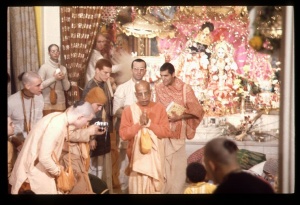CC Madhya 19.74 (1975): Difference between revisions
(Vanibot #0027: CCMirror - Mirror CC's 1996 edition to form a basis for 1975) |
(No difference)
|
Revision as of 05:12, 16 March 2019

A.C. Bhaktivedanta Swami Prabhupada
Below is the 1996 edition text, ready to be substituted with the 1975 one using the compile form.
TEXT 74
- śuciḥ sad-bhakti-dīptāgni-
- dagdha-durjāti-kalmaṣaḥ
- śva-pāko ‘pi budhaiḥ ślāghyo
- na veda-jño ‘pi nāstikaḥ
SYNONYMS
śuciḥ—a brāhmaṇa purified internally and externally; sat-bhakti—of devotional service without motives; dīpta-agni—by the blazing fire; dagdha—burnt to ashes; durjāti—such as birth in a low family; kalmaṣaḥ—whose sinful reactions; śva-pākaḥ api—even though born in a family of dog-eaters; budhaiḥ—by learned scholars; ślāghyaḥ—recognized; na—not; veda-jñaḥ api—even though completely conversant in Vedic knowledge; nāstikaḥ—an atheist.
TRANSLATION
Śrī Caitanya Mahāprabhu said, “‘A person who has the pure characteristics of a brāhmaṇa due to devotional service, which is like a blazing fire burning to ashes all the sinful reactions of past lives, is certainly saved from the consequences of sinful acts, such as taking birth in a lower family. Even though he may be born in a family of dog-eaters, he is recognized by learned scholars. But although a person may be a learned scholar in Vedic knowledge, he is not recognized if he is an atheist.
PURPORT
This verse and the next are quoted from the Hari-bhakti-sudhodaya (3.11, 12), a transcendental literature extracted from the Purāṇas.